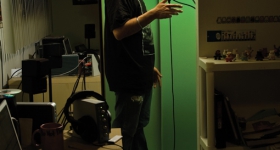Writer Amy Lam
Illustrator Jason Sho Green
The idea of video game music usually conjures up memories of the rudimentary beeps and blips of the Atari and 8-bit Nintendo eras. This is despite the fact that video game music has grown increasingly sophisticated, thanks to high-fidelity technology and the accomplished arrangements of game music composers such as Nobue Uematsu (Final Fantasy series) and Shigeru Miyamoto (Super Mario Brothers, The Legend of Zelda).
Yet to hear Select Start’s version of The Legend of Zelda theme, a tune familiar to video gamers growing up in the ’80s, is to have one’s childhood memories revived and reinvented. From the rapid piano scales of Final Fantasy 9—Eternal Harvest marking the start of a grand adventure, to the folksy guitar solo Zelda—Wind Waker, each change in tempo corresponds to the level changes in one’s mind. And yet, the emotions that arise from hearing these digital melodies played with classical instrumentation are nothing like what one remembers from 8-bit gaming.
Based in Gainesville, FL, Select Start is a six-member ensemble band dedicated to performing video game music covers. Following other emerging game music bands, such as the Minibosses and the NESkimos, Select Start’s style is unique in its arrangements, featuring the cello, piano, violins, guitar and flute.
The band formed in 2002 when three of the members met at a kung fu school. Celloist John Cheng, who jokes “my love [of music] was forcibly imposed by my parents,” had quit playing music after high school. During college, Cheng met future band members Austin Harley (flute) and Dave Yasensky (guitar). It was Yasensky’s idea to perform covers of video game music for a Florida open mic. A network of friends and relatives brought together Robert Lee (violin), Hoyin Kwan (violin) and Christine Lee (piano) to form the original members of the band. Kanako Sueyoshi (violin) and Elaine Li (violin) stepped in after the departures of Kwan and Robert Lee.
The video game industry has been capitalizing on the growing musical appreciation among gamers for years, selling video game soundtracks, one of the most successful being Halo 2, which topped at No. 162 on the Billboard Charts in 2004. Two competing world tours, Video Games Live and Play! (featuring Nobue Uematsu’s music and others), offer live orchestral performances of video game music classics synchronized with a lights and graphics show. Paralleling these developments is the impetus from fans themselves to create music inspired by their favorite games. OverClocked Remix (www.ocremix.org) is a website archive of arrangements and re-interpretations of gaming music created entirely by fans and amateur composers described by some as “free fan art.”
Select Start takes the “bedroom remixes” one step further with its adaptations of video game themes into live classical performances, elevating the music from its synthesized origins. “Our instrumentation is usually more complex than what is possible in a game soundtrack,” Yasensky, one of the band’s composers, explains. “Usually, when I arrange, at least, the instruments we have are used to naturally extend the piece to where we believe it was headed when it was composed … In some of our latest arrangements, we take a lot more liberties with adding new melodies or even completely original passages ... but we generally prefer to stay faithful to the original.”
Some music, which can be perfectly played ad infinitum in the virtual world, proves technically difficult to play in real life. Take the Tetris theme, which begins slowly, then speeds to a frenetic pace as blocks fill the screen. As Cheng explains, “arms just aren’t designed to move that fast.” Another difficult piece, according to Yasensky, is Super Mario Bros. II. “I can come close when we play it slowly, but when it speeds up, I have no chance.”
Performing at local music venues in Florida and at anime conventions, Select Start’s repertoire ranges from mainstream classics such as Sonic the Hedgehog to less commonly known pieces. “We like to throw in at least two pieces from a more obscure video game every show,” says violinist Li. “It keeps the audience on their toes and it’s a lot of fun when someone in the crowd recognizes it.”
Select Start’s performances have elicited unpredictable reactions from the audience. Cheng recalls, “Sometimes, especially Final Fantasy songs, people become highly emotional; we have seen people crying from being so happy or so sad. One time, people made a large Moscow dancing line during Tetris, and a whole bunch of people fell on each other; luckily no one was hurt.”
WANT TO PLAY ALONG?
The Great Video Game
Music Quiz
www.okcupid.com/tests/take?testid=5893955046827478815
Think you can recognize video gaming’s greatest tunes? Test your memory with this quiz.
OverClocked ReMix
www.ocremix.org
Arcade nostalgia permeates this community of amateur and independent composers.
Play! A Video
Game Symphony
www.play-symphony.com
Video Games Live
www.videogameslive.com
Two competing world tours featuring live orchestral performances of video game music.
A Brief Timeline of
Video Game Music
www.gamespot.com/gamespot/features/video/vg_music
Details the artistic and technical history behind video game music, from 1960 to the present.
GAME MUSIC COVER BANDS
Select Start
www.selectstartband.com
Florida-based band.
The NESkimos
www.neskimos.com
A rock outfit based in Florida.
Minibosses
www.minibosses.com
One of the first game music rock bands.
Piano Squall
www.pianosquall.com
A pianist who regularly performs game music covers at animé conventions.
OneUp Mushrooms
www.oneupstudios.com
A jazz-inspired ensemble that just broke up after four years.
Amy Lam is a graphic designer from Dublin, CA. Her favorite video game is Zak McKracken and the Alien Mindbenders.









Comments